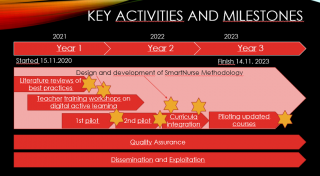Background
The more and more digitalizing society is bringing new challenges and oppotunities in nursing as well as in nursing education. The partner Universities in Latin America have identified the need to develop the nursing curricula and methods of education to strengthen the future nurses digital competences for primary care and health education of patients with chronic diseases.
Goal and milestones
Overall objective of the SmartNurse project is Improved nursing education and digital methodology about health promotion, prevention and basic nursing management of chronic diseases concerning primary health care in Latin American partner countries.
We aim towards this broad objective through three goals:
- Updated curriculum using SmartNurse methodology in Latin American partner institutions
- Improved digital educational skills and pedagogical approaches of the nursing teachers in Latin American partner institutions
- Updated pedagogical methods and tools are in use in nursing education in Latin American partner institutions

The 3-year project will finish at the end of 2023, and it’s key activities will lead to reahing milestones of published literature reviews of best practices, design and development of SmartNurse Methodology through theory base and piloting experiences. Quality assurance and Dissemination and exploitation activities run throughout the project. Each partner institution has a lead on one work package. Tampere University of Applied Sciences has the overall responsibility of project management.
Impact
The expected results of the project are:
- SmartNurse Methodology developed and published,
- SmartNurse recommendations published
- Updated nursing curricula using the SmartNurse methodology
- Network in DigiNurse Community
- Nursing teachers with increased capacity: pedagogical methodology and digital skills
The long-term impacts that the project contributes into:
- Knowledge and skills of curriculum development
- Capacity to further develop the digital and pedagogical competence
- Updated expertise in health promotion, prevention and nursing management of chronic diseases in primary health care and in the use of digital health care technology
- Improved nursing management and use digital health care technology in chronic diseases in primary health care
Funding
The project is funded by Erasmus+ Capacity Building for higher education Programme.
Partners and co-operators
The consotrium consists of seven higher education institutions:
Europe: Tampere University of Applied Sciences (TAMK), Finland, project coordinator. University of Ljubljana (UNILJ), Slovenia.
El Salvador: Universidad de El Salvador (UES). Instituto Especializado de Educación Superior de Profesionales de la Salud (IEPROES). Universidad Gerardo Barrios (UGB).
Mexico: Universidad Autónoma de Aguascalientes (UAA). Universidad Autónoma de San Luis Potosí (UASLP).

